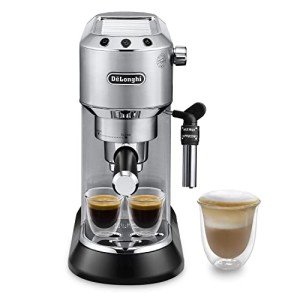Who Is Home Espresso Machines And Why You Should Care
The Rise of Home Espresso Machines: A Comprehensive Guide
As coffee enthusiasts continue to seek fresh and tasty brews in your home, the popularity of home espresso machines has actually risen over the last few years. No longer simply the domain of cafes and cafe, these machines empower individuals to craft barista-quality espresso beverages from the comfort of their cooking areas. White Espresso Machines will check out the numerous kinds of home espresso machines, their functions, and considerations for choosing the best one. In addition, it will supply a choice of FAQs to assist prospective buyers make informed choices.
Kinds Of Home Espresso Machines
Home espresso machines can be classified into numerous categories based on their mechanisms and user-friendliness. Each type has its special features, pros, and cons.
Type
Description
Pros
Cons
Manual Espresso Machines
Needs the user to manually manage the brewing procedure, including strategies like pulling a lever to develop pressure.
- Complete control over brewing process
- Compact design
- Requires skill and practice
- Time-consuming
Semi-Automatic Machines
Machine automates water flow and pressure, but the user still controls the dosing and period of the developing process.
- Balance of automation and control
- Versatile
- Learning curve for perfecting strategies
Totally Automatic Machines
Automates the entire brewing process, from grinding to developing, frequently with programmable settings for personalized beverages.
- Extremely easy to use
- Quick and practical
- Less control over the brewing procedure
- Higher rate point
Capsule or Pod Machines
Uses pre-packaged espresso pills or pods to develop coffee quickly and quickly.
- Extremely simple to use
- Minimal clean-up
- Limited flavor variety
- More expensive per cup than ground coffee
Super-Automatic Machines
Integrates functions of fully automatic machines with built-in mills, enabling users to brew whole bean espresso and milk-based drinks with one touch.
- All-in-one benefit
- Ideal for milk-based drinks
- Often the most costly
- Can be bulky
Features to Consider
When choosing a home espresso machine, prospective purchasers must consider the following features to guarantee they pick a machine that satisfies their requirements:
Grinder Type:
- Built-in mills can supply fresher grounds however may need more upkeep.
- Separate mills enable more modification of grind size.
Pressure:
- Look for machines that produce a minimum of 9 bars of pressure, which is ideal for developing espresso.
Water Temperature Control:
- Machines with adjustable temperature level settings allow for better extraction of taste from beans.
Milk Frothing Options:
- Consider whether you want a manual steam wand for frothing or an automatic milk frother for convenience.
Ease of Cleaning:
- Machines with detachable parts and self-cleaning functions considerably minimize cleanup time.
Size and Design:
- Ensure the machine fits comfortably in your cooking area and aligns with your visual preferences.
Budget:
- Set a budget before beginning your search, as prices can vary significantly from affordable designs to high-end machines.
Benefits of Home Espresso Machines
Owning a home espresso machine offers numerous advantages:
- Cost-Effective: Over time, brewing espresso in the house can conserve coffee enthusiasts cash compared to regular café check outs.
- Personalization: Users can try out different beans, grind sizes, and brewing techniques to find their best cup.
- Convenience: The capability to brew espresso whenever removes the need to head out to a coffee shop, especially useful throughout late nights or mornings.
- Quality Control: With a home machine, individuals have complete control over the quality of active ingredients and developing procedures.
Downsides of Home Espresso Machines
However, there are some disadvantages to consider:
- Initial Investment: High-quality espresso machines can be costly, needing a considerable upfront investment.
- Knowing Curve: Mastering the art of espresso brewing can take time and practice, which might be daunting for novices.
- Upkeep: Like any device, espresso machines require routine cleansing and upkeep to ensure optimal efficiency.
Frequently asked questions
1. What is the very best kind of home espresso machine for beginners?
Response: For novices, a semi-automatic machine is often advised as it uses a balance in between control and automation, enabling you to find out the basics without overwhelming complexity.
2. How Black Espresso Machines should I invest in a home espresso machine?
Response: Entry-level machines can start around ₤ 100 to ₤ 300, while higher-end models can vary from ₤ 500 to over ₤ 2000. It's important to set a budget based upon your expected usage and preferred functions.
3. Do I need a different grinder?
Answer: While some espresso machines feature integrated mills, buying a separate grinder permits for greater modification and ensures much better quality premises.
4. How typically should I clean my espresso machine?
Answer: Cleaning frequency can vary by machine type, but it's usually advised to clean the machine after each use and carry out deep cleanings weekly or regular monthly, depending upon use.
5. Can I make milk-based drinks with any espresso machine?
Response: Not all machines come with milk frothing abilities. If you enjoy beverages like lattes or coffees, search for a machine with a steam wand or automatic frother.
Home espresso machines are changing the way coffee fanatics enjoy their beloved brews. With various types and advanced features readily available in the market, there is something for everyone. Whether it's the joy of creating unique recipes or just appreciating the ideal shot of espresso, investing in a home espresso machine can enhance both the coffee-drinking experience and the lifestyle for coffee lovers everywhere. As with any investment, it is important to weigh the advantages against the possible drawbacks and choose a machine that flawlessly fits both your way of life and choices.
